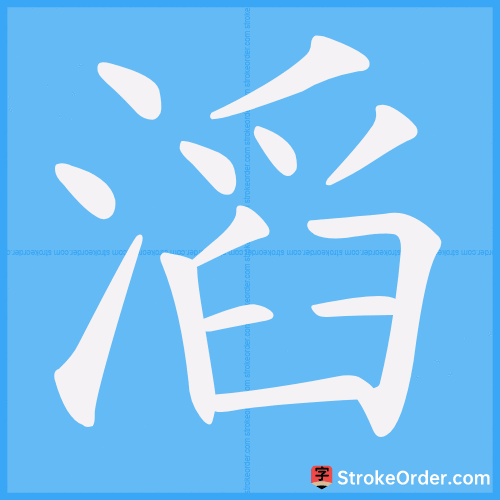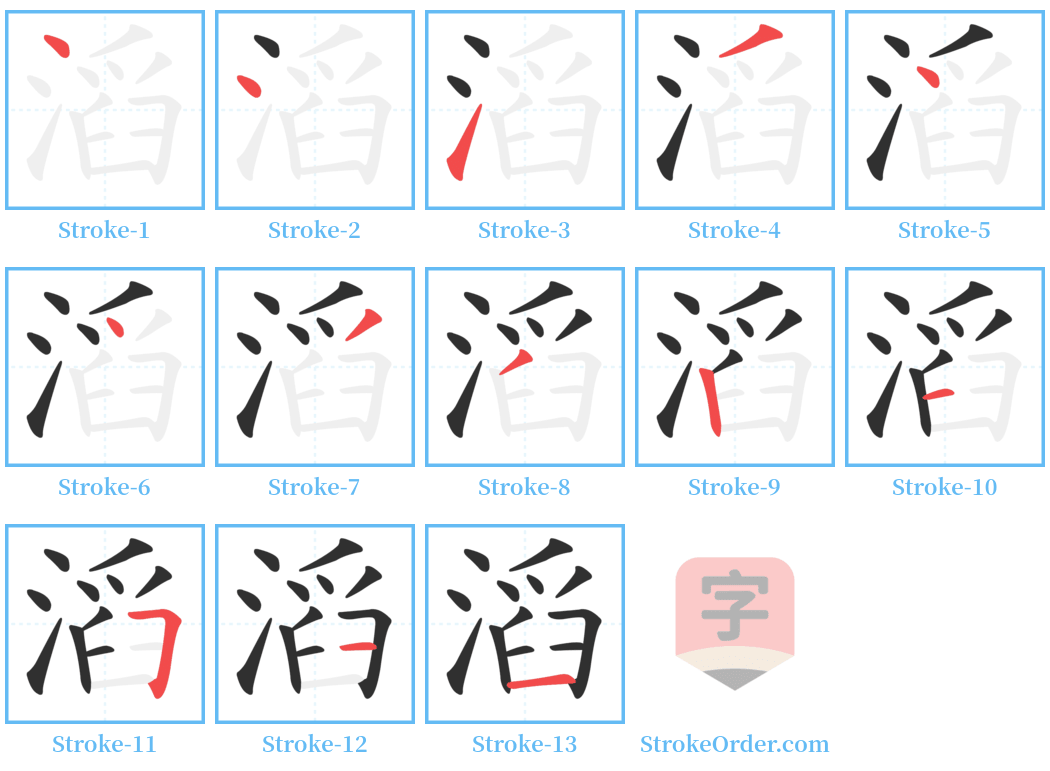滔 Stroke Order
Animated Stroke Order of 滔

Stroke Order Diagrams for 滔

Step-by-Step Handwriting Guide for 滔

Learn to Write Chinese Characters with Video Tutorials
Watch the video of writing the Chinese character "滔", learn the correct stroke order (笔顺) of the character "滔", and master the standard way of writing the character "滔".
Free Printable Handwriting Practice with Stroke Order: 滔
Printable Writing Practice Worksheet of "滔" in Portrait Orientation (Tian Zi Ge)

Printable Writing Practice Worksheet of "滔" in Landscape Orientation (Tian Zi Ge)

Information of 滔
Pinyin
tāo
Radical
氵
Strokes
13 strokes
Usage
★★★★★
Definition
overflow / torrent-dash
滔 [tāo]
1. To be widespread, to be filled.
- 弥漫,充满:~天。~~。
- English: To be widespread, to be filled: inundating the sky. To flood.
2. Arrogant.
- 倨慢:“士不滥,官不~”。
- English: Haughty: "Scholars are not reckless, officials are not arrogant."
3. Vast.
- 广大。
- English: Wide and long.
---
滔 [tāo] (as an adjective)
Definition: The appearance of large water force.
Character formation: Phonetic-semantic, combining water and the sound "yǎo."
1. Same as the original meaning (inundating).
- 引:
1. "说文": 滔,水漫漫大貌。 (In "Shuo Wen": 滔 refers to the vastness of water.)
2. "广雅": 滔,漫也。 (In "Guang Ya": 滔 means to overflow.)
3. "书·尧典": 象恭滔天。 (In "Book of Documents": Symbolizes respect inundating the heavens.)
4. 浩浩滔天。
5. "诗·齐风·载驱": 汶水滔滔。 (In "Book of Poems": The Wen river flows continuously.)
6. "诗·小雅·四月": 滔滔江汉。 (In "Book of Poems": The Yangtze and Han rivers surge.)
7. "书·益稷": 洪水滔天,浩浩怀山襄陵。 (In "Book of Documents": The flood inundates the heavens, rolling forth from the mountains.)
- Example:
- 又如:滔涸(水漫溢与干涸);滔漭(水弥漫浩广的样子);滔滔滚滚,滔漫(大水漫溢)
- English: For example: 滔涸 (flooding and drying up); 滔漭 (the vast appearance of water); 滔滔滚滚, 滔漫 (flooding, overflowing waters).
2. Arrogant, domineering.
- 引:
1. "左传·昭公二十六年": 士不滥, 官不滔。 (In "Zuo Zhuan": Scholars are not reckless; Officials are not domineering.)
- Example:
- 又如: 滔德(倨慢不恭的品格)
- English: For example: 滔德 (the character of arrogance and disrespect).
3. Vast.
- Example:
- 如: 滔土(广阔的土地); 滔窕(广远不着边际)
- English: Such as: 滔土 (vast land); 滔窕 (wide and endless).
---
滔 [tāo] (as a verb)
1. To cause a flood.
- 引:
1. "淮南子": 舜之时,共工振滔洪水,以薄空桑。 (In "Huainanzi": During the time of Shun, the floodwaters surged due to Gonggong, overwhelming the Mulberry trees.)
2. To swarm together.
- 引:
1. "庄子": 无器而民滔乎前。 (In "Zhuangzi": Without tools, the people swarm forward.)
Input Method for 滔
Pinyin
tao1
Wubi
ievg|ieeg
Cangjie
ebhx
Zhengma
vpnb
Four Corner
32177
Unicode
U+6ed4
Same Pronunciation Characters